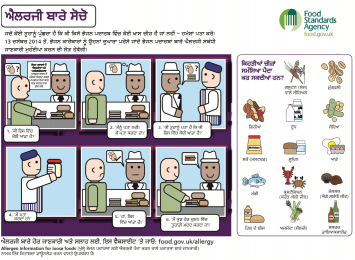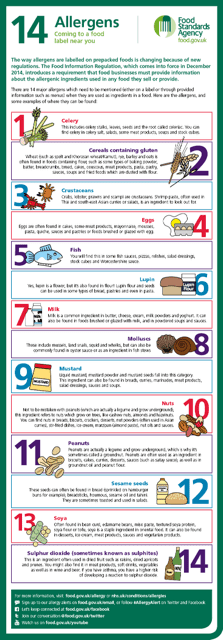

 BIRMINGHAM, UK—Sikh Council UK have alerted the Sangat of an important piece of European legislation called the Food Information for Consumers Regulation (EU FIC). As of 13th December 2014, the regulation will change the way allergen information appears on labels and on food that is pre‑packed, sold loose or served when you are eating out.
BIRMINGHAM, UK—Sikh Council UK have alerted the Sangat of an important piece of European legislation called the Food Information for Consumers Regulation (EU FIC). As of 13th December 2014, the regulation will change the way allergen information appears on labels and on food that is pre‑packed, sold loose or served when you are eating out.
At the moment it is unclear as to how exactly it would apply to langar but it certainly applies to food bought loose that is served in Gurdwaras and at events such as weddings. Given that some people suffer from food allergies or food intolerance or may have diet related conditions, it is vitally important to be aware of the 14 allergens that need to be declared and made publicly available if they are present in the langar.
One way of managing this may be to standardise the menus and to strictly control cross contamination. Furthermore, we also need to make the Sangat aware of the requirements when buying loose cooked food for events.
Fourteen major allergens that need to be identified within the ingredients list are:
-
Cereals containing gluten
-
Peanuts
-
Soya-beans
-
Milk
-
Nuts, such as almonds, hazelnuts, walnuts, pecan nuts, Brazil nuts, pistachio, cashew and macadamia (Queensland) nuts
-
Celery (and celeriac)
-
Mustard
-
Sesame
-
Sulphur dioxide, which is a preservative found in some dried fruit
-
Lupin
Non vegetarian:
-
Crustaceans, for example prawns, crabs, lobster and crayfish
-
Eggs
-
Fish
- Molluscs, for example clams, mussels, whelks, oysters, snails and squid
- Further details can be found on the Food Standards Agency website. Important note: There may be fines and penalties associated to failure to comply or any breach of the regulation particularly if anyone has an allergy reaction or when asked, the providers of the food were not able to provide accurate information as to presence of allergens in the ingredients.
Suggested actions for Gurdwaras:
1. Ensure that sewadars that are involved in preparing langar are aware of the allergens -perhaps a chart can put on display with images and words in Punjabi and English.
2. The food prepared containing the allergens is kept separate from the rest of the food to prevent any cross contamination.
3. The Sangat is generally advised that the langar may contain the list of allergens and that there is a risk of cross contamination.
4. Questions by consumers must are asked about the ingredients in any dish by a consumer then someone needs to be able to answer accurately.
5. Set out arrangements to control the menus and loose food brought in.





